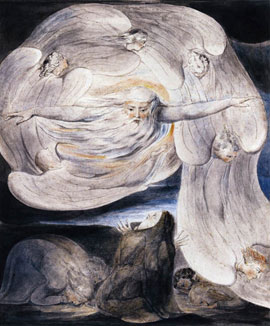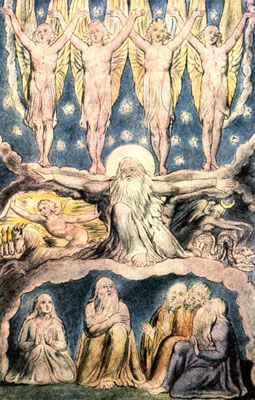
Job, the Prosecuting Attorney by Deborah Beach Giordano
The Protest
 After enduring the destruction of his property, the loss of his wealth and his social standing, the deaths of all of his children and, finally, inflicted with a painful, disfiguring disease, Job left the ruins of his life and parked himself in the local ash heap — the remains of the city’s trash. It was a perfect embodiment of his situation; discarded, burned out, shunned, scorned, and smelly, and avoided by everyone. It was his protest against wrongful treatment, a sit-in directed at the Divine Judge.
After enduring the destruction of his property, the loss of his wealth and his social standing, the deaths of all of his children and, finally, inflicted with a painful, disfiguring disease, Job left the ruins of his life and parked himself in the local ash heap — the remains of the city’s trash. It was a perfect embodiment of his situation; discarded, burned out, shunned, scorned, and smelly, and avoided by everyone. It was his protest against wrongful treatment, a sit-in directed at the Divine Judge.
Job’s wife told him that he should give up; his case was hopeless, there was no way that he would receive justice; God was inscrutable, heartless, unmovable. But Job refused to surrender.
With Friends Like These…
Job was not entirely abandoned and alone, however; in addition to his wife, three friends came to see him. Unfortunately, they brought with them no compassion (or casseroles!); they did not come to listen, but to condemn, behaving like judges rather than advocates. Job’s visitors were more concerned with justifying God’s actions than with comforting their friend, and thus they added to his pain.
 These “friends” offered Job well-intentioned but highly-critical “consolations”; accusing him of insolence or ignorance, convinced that he was guilty of some great wrongdoing for which God was rightly punishing him, and which he refused to confess. Just own up to your sin and ask forgiveness, they counseled, because this disaster has to be of your own making: God is the Author of all harm that befalls us — and He is never wrong or unfair.
These “friends” offered Job well-intentioned but highly-critical “consolations”; accusing him of insolence or ignorance, convinced that he was guilty of some great wrongdoing for which God was rightly punishing him, and which he refused to confess. Just own up to your sin and ask forgiveness, they counseled, because this disaster has to be of your own making: God is the Author of all harm that befalls us — and He is never wrong or unfair.
But Job knew differently; he knew he didn’t deserve to be in that situation; he wasn’t to blame for the agony he was suffering, and he insisted and insisted and insisted on his innocence. Further, he was going to stay right where he was; camped out at the city dump, demanding justice, proclaiming the utterly unfair nature of what had been done to him, until God answered his complaint, or he died.
The Trial
Job’s story is one of outraged innocence — and a ferocious commitment to the principle of justice. In his fierce desire to prove that his suffering was not merited, that God’s will is not the same as what we glibly refer to as “karma” (“You get what you deserve,” “Chickens always come home to roost,”) Job began to conduct a trial of God in absentia — judging Him as distant, aloof, uncaring, unconcerned, and unwilling to admit of His own wrongdoing. God in the witness stand: Job demanded nothing less. It was a gutsy move — perhaps a half-mad one, born of desperation.
 Sadly, as he builds his case against the Divine Presence, Job appears to convince himself that there is no point to it all; that God truly does not care, that perhaps God isn’t even there. Carried away by his grief and grievances, Job’s plea for justice turns into a call for destruction, darkness, and death; his despair becomes a death-wish — never specifically, yet every phrase Job speaks, every image evoked is of endings, of shadows and silence and emptiness.
Sadly, as he builds his case against the Divine Presence, Job appears to convince himself that there is no point to it all; that God truly does not care, that perhaps God isn’t even there. Carried away by his grief and grievances, Job’s plea for justice turns into a call for destruction, darkness, and death; his despair becomes a death-wish — never specifically, yet every phrase Job speaks, every image evoked is of endings, of shadows and silence and emptiness.
Out of the Whirlwind
Then, from the midst of a whirlwind — a wild, shimmering, earthshaking storm like the chaos from which creation was brought forth — God, the Eternal, the Almighty, the Profoundness We Cannot Comprehend, speaks. And Job gets more than he bargained for: he suddenly finds himself in the position of defendant as the Voice demands: “Who are you to say these things? How dare you talk such trash?”
God appears, and Job’s case against Him crumbles: God is not absent or uncaring. God does hear, and does respond — and sometimes shows up. But God offers no excuses or explanations nor offer an apology for Job’s tragedies. The Divine response is not an answer, but a revelation, a proclamation: a song of the earth, a hymn to creation, a passionate celebration of life (as told by Deborah):
You grieve and despair,
disdaining life,
desiring death,
praising
the silent abyss;
preferring
eternal darkness,
craving
erasure,
absence,
endless nothingness.

Claiming to be unheard,
a voice crying in the wilderness,
you have judged and condemned Me —
now I will take My turn,
I will speak as the Prosecutor:
now I shall accuse you.
I challenge you,
O Mortal,
to behold
what lies beyond
your sight,
your understanding,
your imagination;
open your eyes,
your thinking —
see what I have done:
the ocean and its tides,
the whales and their journeys,
the dolphins and their dancing,
the seals and their frolics,
the sand dabs and the mollusks,
the crabs and the starfish;
the citizens of the seas
in their uncounted abundance
beneath the glistening surface,
treasures unseen,
as pearls within oysters;
the sky and its endless permutations,
the azure-coated fog banks,
the many splendored dawnings,
the radiant sunsets
fading softly into darkwinged nights
revealing a thousand thousand stars
who sing each new day into being,
calling forth a new creation
as all of heaven shouts with joy;

sunshine and shadows,
elephants and ostriches,
salamanders and sea turtles,
crows and cattle and calla lilies,
roses and robins and rainbows,
love and loss and longing:
the whole garden of earthly delights,
the Author of all this I AM.
Do you not know?
Have you not heard?
The everlasting God,
Creator of the whole earth
never grows faint or weary;
My compassion is limitless,
My understanding beyond
the breadth and depth
your soul can reach.
As it was from the beginning,
is now,
and ever shall be:
here I AM.
The Answer
God’s answer to Job is a two-fold revelation: in the immediate encounter and — more important — as a reminder of what has already and always been: God revealed in creation. In responding to Job’s complaint, the Eternal says: You want to see Me? You want to know of My intentions, My concerns, My Ultimate Desire? Then look around you.
Divine grace is everywhere present.
God does not dismiss Job’s pain or loss, but — as we might say — “reframes” it. Here and now, in the midst of everything, there is grandeur and glory; throughout delights and distress, trials and troubles, suffering and celebration, I AM with you.
 Job’s accusation that God is malicious or negligent is refuted by a thousand sources of amazement and delight. The whole earth is absolutely covered with divine fingerprints, from the massive to the minuscule — all creation, great and small! — hummingbirds and humpback whales, goldfish and gorillas, dragonflies and dogs, ants and antelopes, and… well, you get the idea.
Job’s accusation that God is malicious or negligent is refuted by a thousand sources of amazement and delight. The whole earth is absolutely covered with divine fingerprints, from the massive to the minuscule — all creation, great and small! — hummingbirds and humpback whales, goldfish and gorillas, dragonflies and dogs, ants and antelopes, and… well, you get the idea.
When I behold Your heavens, the work of Your fingers, the moon and the stars which You set in place — what is humanity that You pay us any mind? Why do You care for us as You do?
~ Psalm 8:3-4
But What About Me?
When we are suffering, we become the center of the universe (our universe), and all of the fragrant flowers and buzzing bees in the world may not be enough to pull us through:
What is man that You should exalt him, that You should set Your heart upon him, that You attend to him every morning, and test him every moment? Can’t You leave me alone, not even for a minute?
~ Job 17:17-19

Sometimes it can feel as if everything is going wrong, as if we are encircled by enemies, as if even God is against us. That’s how it was for Job: the experience of darkest despair. And so he shouted at God, demanding to be heard, insisting that his suffering be acknowledged, refusing to go down without a fight. Then something happened: a breakthrough, an epiphany, an insight; something brought him to a place of understanding, perhaps acceptance; somehow Job was changed by the experience.
The story of Job is an affirmation that we are not alone in the universe, nor are we insignificant — yet neither can we order God about like a servant. The Holy One is far more than we can conceive of or apprehend, and is powerfully present. Our voices are heard, but not obeyed.
Life doesn’t always work out as we desire, but God abides. All else rises and falls, comes into being, changes and reshapes; is born, lives and loves and dies — and God abides; God, the Everlasting, the One into which all that is or ever was, is enfolded.
The End?
The author of Job’s story gives it a “happily ever after” conclusion. We are told that Job’s disease is cured, his fortunes are restored, his herds are doubled; he returns to a position of authority in his community, and formerly absent relations appear and eagerly flock to his table, partaking of the rich foods and fine wines he can now provide. His wife bears him seven children, including three exceptionally beautiful daughters, and Job enjoys a long life, living to see his great-great grandchildren.
That’s nice. We like happy endings. But I wonder….
In my end is my beginning.
~ T.S. Eliot, Four Quartets; East Coker
Does Job literally regain all that was lost or does he, with new-found understanding and wisdom, realize that he is already far richer than the wealthiest prince? Has his changed circumstance made him more compassionate; is he now a genuinely wise man, a sage who can sit at the city gates and dispense advice that is meaningful and truly just?
Has his experience freed Job from the need to amass and accumulate to impress his “friends”? Does he go through the town like a character in a story I once read, looking in shop windows and saying, “I don’t need that, or that, or that, or that!”? Does Job’s family increase not by new births, but through his affection and concern for others? Are his daughters especially beautiful because of the love-light in their father’s eyes? Is one of the “newborns” Job’s own soul?
And, as for us, can we hope to be as wise as Job?
Virtual hugs and real-time blessings,
Deborah ✝
Suggested Spiritual Excercise
Clare of Assisi is said to have proclaimed on her deathbed, “Thank You, Lord, for allowing me to be a human being.”